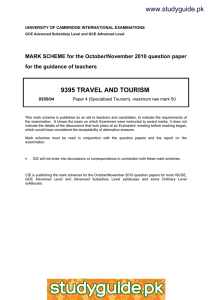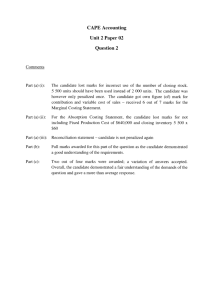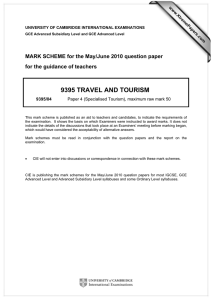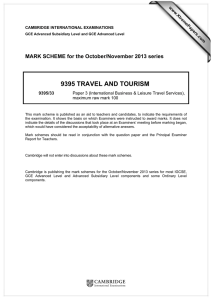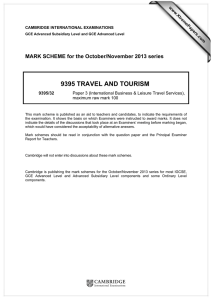9395 TRAVEL AND TOURISM for the guidance of teachers
advertisement
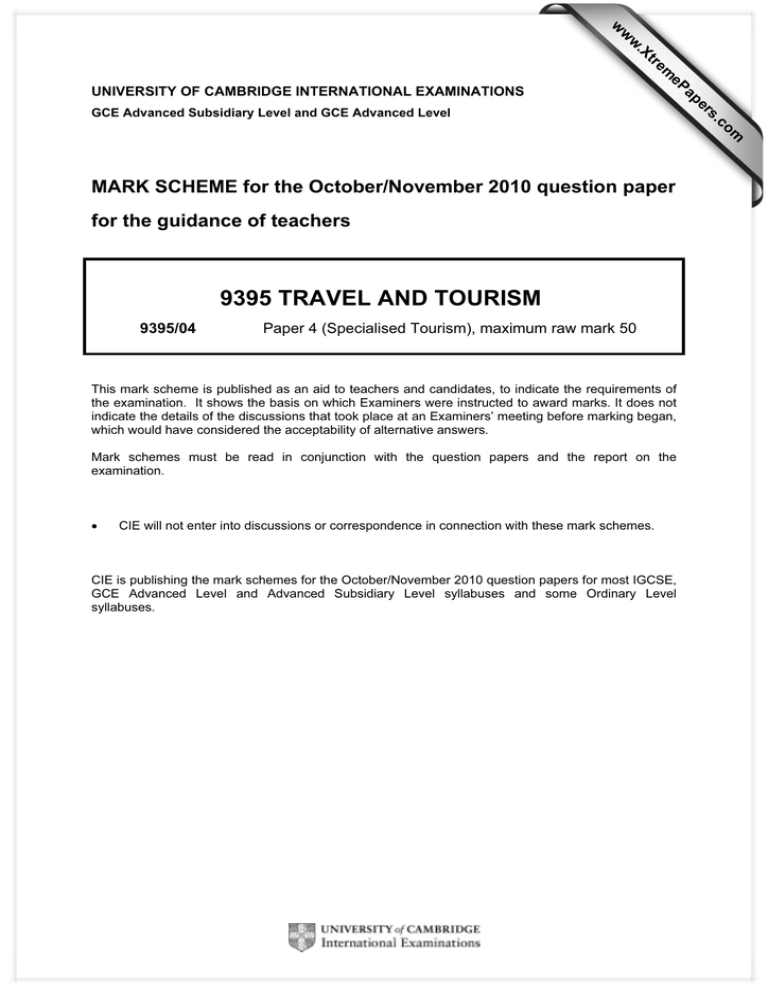
w w ap eP m e tr .X w UNIVERSITY OF CAMBRIDGE INTERNATIONAL EXAMINATIONS for the guidance of teachers 9395 TRAVEL AND TOURISM 9395/04 Paper 4 (Specialised Tourism), maximum raw mark 50 This mark scheme is published as an aid to teachers and candidates, to indicate the requirements of the examination. It shows the basis on which Examiners were instructed to award marks. It does not indicate the details of the discussions that took place at an Examiners’ meeting before marking began, which would have considered the acceptability of alternative answers. Mark schemes must be read in conjunction with the question papers and the report on the examination. • CIE will not enter into discussions or correspondence in connection with these mark schemes. CIE is publishing the mark schemes for the October/November 2010 question papers for most IGCSE, GCE Advanced Level and Advanced Subsidiary Level syllabuses and some Ordinary Level syllabuses. om .c MARK SCHEME for the October/November 2010 question paper s er GCE Advanced Subsidiary Level and GCE Advanced Level Page 2 1 Mark Scheme: Teachers’ version GCE A/AS LEVEL – October/November 2010 Syllabus 9395 Paper 04 (a) Explain three ways in which a successful eco-tourism experience is likely to bring economic benefits to the local people of Andros Island. [6] One mark each for up to three identifications, with a further mark each for explanation, from: • job creation (1), increased wealth of the country GDP (1) • prevents poverty (1), increases opportunity to work and personal and community wealth (1) • improves standards of living (1) • any other sensible suggestion. (b) Assess how the growth of tourism activity in Andros may have a negative environmental impact on the coastal environment. [9] Level 1 (1–3 marks) Candidate identifies how growth of tourism activity can have a negative environmental effect on the coastal environment. Level 2 (4–6 marks) Candidate analyses/explains how growth of tourism activity can have a negative environmental impact. Level 3 (7–9 marks) Candidate assesses the negative environmental impacts using good examples. should have relevant conclusion and assessment should be valid. Top L3 Indicative comment: • loss of plants and species • loss of biodiversity • loss of areas for breeding and feeding fish and bird life • damage to surrounding reefs (c) Discuss how the principles of eco-tourism may be compatible with an all-inclusive resort such as Small Hope Bay. [10] Level 1 (1–3 marks) Candidate identifies areas of compatibility. Level 2 (4–6 marks) Candidate analyses/explains areas of compatibility. Level 3 (7–10 marks) Candidate discusses areas of compatibility using examples from stimulus or other. Top L3 will include conclusion and discussion will look at both sides of the argument. From: • control/keep people in an area and only under supervision • protects land/landscapes, stops unwanted movement and assists with only guided tours • helps to educate and prevent unnecessary damage Any other sensible suggestions. © UCLES 2010 Page 3 2 Mark Scheme: Teachers’ version GCE A/AS LEVEL – October/November 2010 Syllabus 9395 Paper 04 (a) The adventure holiday in Kas only runs between June and October each year. State three negative economic impacts this may have on the local Turkish community. [3] One mark for up to three identifications from: • seasonal jobs (1) • loss of earnings in winter or off-peak months (1) • can’t train/take other jobs at this time of year (1) • dependent on visitors for work in that period (1) (b) Explain two ways in which negative environmental impacts can be minimised at destinations such as Kas. [4] One mark for up to two identifications of negative environmental impacts, with a further one mark each for exemplification. From: • zoning (1) (careful setting of zones to keep damage to minimum) (1) • pricing mechanisms (1) charging to reduce usage and lessen damage (1) • education (1) use of conservation message to all visitors and locals alike (1) or similar (c) Assess how the adventure activities in Kas may create negative impacts for other visitor groups. [9] Level 1 (1–3 marks) Candidate identifies negative impacts on other visitor groups. Level 2 (4–6 marks) Candidate analyses/explains negative impacts on other visitor groups. Level 3 (7–9 marks) Candidate assesses negative impacts on other visitor groups. Top L3 will have a conclusion and relevant assessment of how adventure activities may create these impacts. From: • can cover socio-cultural, environmental, economic, etc. • noise • wash from boats causing disruption to banks, affecting other users such as fishermen, sailors relaxing • visual perception • carrying capacity Any other sensible suggestion. Impacts on other visitor groups, not on the host population. © UCLES 2010 Page 4 Mark Scheme: Teachers’ version GCE A/AS LEVEL – October/November 2010 Syllabus 9395 Paper 04 (d) ‘Travel Mood Adventures’ believe they act as a responsible tour operator. Evaluate the social and cultural benefits to the local community of working with such organisations. [9] Level 1 (1–3 marks) Candidate identifies benefits to the local community. Level 2 (2–6 marks) Candidate explains/analyses the benefits to the local community. Level 3 (7–9 marks) Candidate evaluates the benefits to the local community of working with responsible tour operators. Top L3 has a relevant conclusion. From: • job creation/wealth • multiplier effect – linked to accommodation and transport users • responsible tourism looks after environment and saves the area for long-term benefit of locals and visitors alike – extending life of the area and keeping culture, economic and environmental benefits • damage is minimal • popular message of eco-tourism is promoted © UCLES 2010
